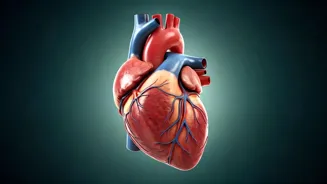Dietary Choices Matter
The food you consume directly influences your heart's condition. Certain dietary patterns can either harm or protect your cardiovascular system. For instance,
limiting red meat and butter intake is crucial. Instead, focus on incorporating heart-healthy foods into your diet. Consider incorporating a variety of fruits, vegetables, and whole grains. Foods rich in fiber and low in saturated fats are excellent choices. Conversely, avoid excessive consumption of processed foods, sugary drinks, and foods high in sodium. These choices can contribute to high blood pressure and cholesterol levels, raising the risk of heart attacks and other cardiac problems. By making conscious food choices, you can significantly lower your risk of heart disease and improve your cardiovascular health.
Lifestyle Habits Analyzed
Beyond diet, certain lifestyle habits can either support or undermine heart health. Regularly indulging in physical activity is paramount. Aim for at least 150 minutes of moderate-intensity exercise or 75 minutes of vigorous-intensity exercise per week. This can include brisk walking, running, swimming, or cycling. In addition, managing stress is critical. Chronic stress can elevate blood pressure and increase the risk of heart problems. Techniques like meditation, yoga, or spending time in nature can effectively reduce stress levels. Furthermore, avoiding sitting immediately after meals is beneficial. This habit can potentially increase the chances of heart attacks, as studies suggest. Taking breaks and moving around after meals can improve digestion and overall health. Finally, ensuring adequate sleep is also important. Lack of sleep can affect cardiovascular function, increasing the risk of heart disease. Aim for seven to nine hours of quality sleep each night.
Proactive Health Checks
Regular medical check-ups are vital for early detection and management of heart-related issues. Consult your doctor for routine screenings, including blood pressure, cholesterol levels, and blood sugar. Early detection allows for timely interventions, potentially preventing serious cardiac events. If you have a family history of heart disease or other risk factors, more frequent check-ups might be necessary. Besides routine check-ups, monitor for any warning signs, such as chest pain, shortness of breath, and unexplained fatigue. Do not ignore these symptoms. Seek immediate medical attention if you experience any of these. Additionally, understanding the symptoms of high blood pressure is crucial. Regular monitoring of blood pressure can help prevent complications associated with this condition. Remember that being proactive about your health can significantly enhance your chances of living a long and healthy life.
The Power of Supplements
Certain supplements can support heart health when integrated into a balanced lifestyle. Fish oil supplements, rich in omega-3 fatty acids, can promote heart health by reducing inflammation and improving cholesterol levels. However, it's critical to consult a healthcare professional before starting any new supplement regimen. Vitamin D deficiency can sometimes contribute to heart problems, so testing and supplementation, if needed, might be beneficial. Always prioritize a comprehensive approach to healthcare, which includes dietary changes, exercise, regular check-ups, and appropriate supplementation when necessary. It's also important to consult with your doctor regarding the suitability and dosage of any supplements you plan to take. Making well-informed decisions based on professional medical advice is key to safeguarding your heart.
Preventative Measures Defined
Adopting specific preventive measures can significantly reduce the risk of heart disease. One critical aspect is controlling blood sugar levels, as elevated blood sugar can damage blood vessels and increase the risk of heart problems. Managing blood sugar includes diet, exercise, and medication if prescribed by a doctor. Adopting a vegan lifestyle has been associated with a lower risk of diabetes, heart disease, and cancer due to the exclusion of animal products. Another essential preventive measure is maintaining a healthy weight, as excess weight can strain the heart. This involves a combination of diet and exercise. Finally, reducing stress levels through activities like yoga, meditation, or spending time outdoors can also help protect the heart. By focusing on preventive measures, individuals can take control of their heart health and decrease their chances of developing cardiovascular issues.












